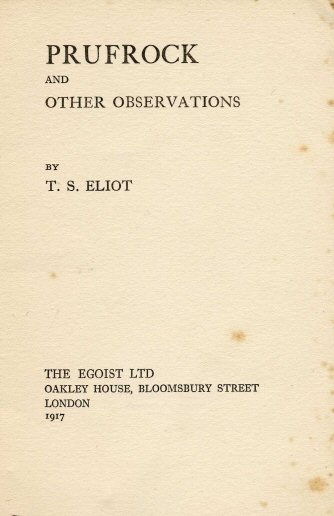Read about "The Love Song of J. Alfred Prufrock"
Read about "Tradition and the Individual Talent"
Translation of epigraph:
The epigraph comes from Dante's Inferno, Canto 27, lines 61-66. The words are spoken by one Guido da Montefeltro, who has been consigned to a suit of flame in the eighth circle of Hell as punishment for giving false counsel. He is, essentially, a liar, one who withholds or obscures the truth for personal gain at the cost of others. Interestingly, the famous literary hero Ulysses is also there, trapped in his own suit of flame for the same sin: he convinced his crew, after they had all safely returned home from war, to venture back out into open sea to look for more adventure. The ship was ultimately destroyed in a storm, and they all drowned. Here is the translation:
If I believed that my reply were made
to one who could ever climb to the world again,
this flame would shake no more. But since no shade
ever returned—if what I am told is true—
from this blind world into the living light,
without fear of dishonor I answer you.
The presence of this epigraph, followed by the ambiguous "then" in the first line of the poem, suggests that Prufrock is (a) a false counselor himself, (b) the Dantean poet who has returned from Hell to report back to us, or (c) some combination of both. Consider the last word of the poem--is Prufrock the anti-hero who invites us on a journey that ends in death?
Class Discussion Questions:
"The Love Song of J. Alfred Prufrock"
- You were asked to listen to T.S. Eliot read his own poem. As you listen and read along next time, mark your text when you notice the following. Have you already noticed some?
- repeated phrase or rhythm
- metaphors that capture an emotion
- signs of communication breakdown
- evidence of the speaker's self-consciousness
- What is the significance of the epigraph, especially considering that the poem ends with the word "drown"?
- Identify some words in the poem that suggest the act of writing itself. Why would this speaker use these kinds of words in a "love song"?
- If the speaker of this poem, Prufrock, is leading us on a journey, what kind of journey is it?
- What does Eliot mean by "No poet, no artist of any art, has his complete meaning alone"? How does the "historical sense" relate to being part of a bigger collection of meaning?
- What is the catalyst analogy that Eliot explains and how does it relate to the impersonal theory of poetry (see beginning of Part II)?
- What kind of emotion does Eliot want to see in poetry? How can the poet achieve this kind of emotion?
- How can a poet be new and traditional at the same time? What does Eliot mean by "new"?
- How does Eliot directly respond to Wordsworth's theory of poetry in his "Preface to Lyrical Ballads"?
